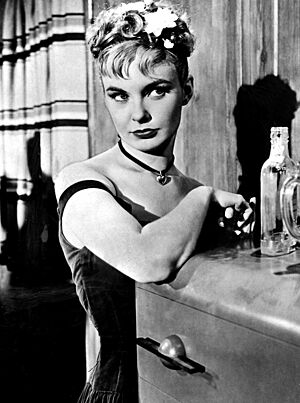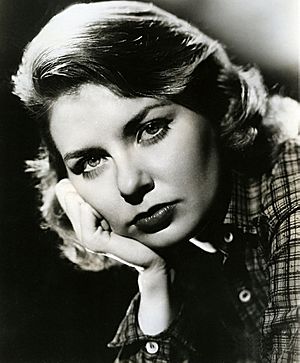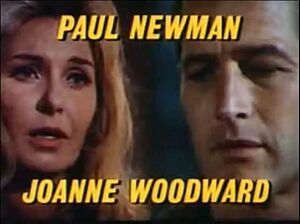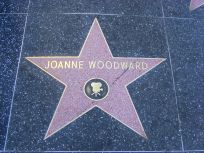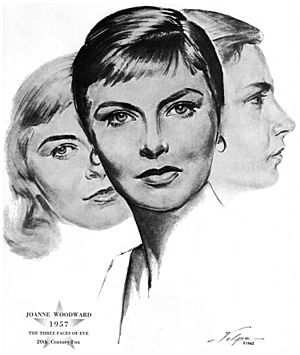Joanne Woodward facts for kids
Quick facts for kids
Joanne Woodward
|
|
|---|---|
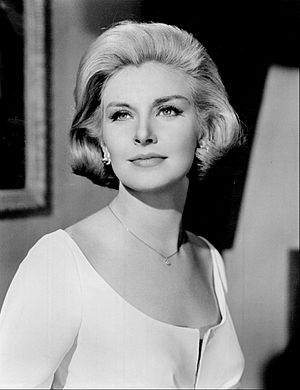
Woodward in 1964
|
|
| Born |
Joanne Gignilliat Trimmier Woodward
February 27, 1930 Thomasville, Georgia, U.S.
|
| Other names |
|
| Alma mater | Sarah Lawrence College |
| Occupation | Actress |
| Years active | 1950–2013 |
| Spouse(s) | |
| Children | 3, including Nell and Melissa Newman |
| Awards | Full list |
Joanne Woodward (born February 27, 1930) is an American actress who is now retired. She became famous in the 1950s for playing interesting and deep characters. She won many awards, including an Academy Award, three Primetime Emmy Awards, a British Academy Film Award, and three Golden Globe Awards. She is the oldest living person to have won the Academy Award for Best Actress.
Woodward is well-known for her role in the movie The Three Faces of Eve (1957). In this film, she played a woman with different personalities, which earned her an Academy Award for Best Actress. She was married to actor Paul Newman until he passed away. They often worked together in movies, either acting side-by-side or with him directing. In 1990, Woodward earned her college degree from Sarah Lawrence College at age 60, graduating with her daughter Clea.
Contents
Early Life and Acting Dreams
Joanne Gignilliat Trimmier Woodward was born on February 27, 1930, in Thomasville, Georgia. Her mother loved movies, which inspired Joanne to become an actress. Her mother even named her after the famous actress Joan Crawford. Joanne also has an older brother, Wade Jr.
When she was nine, Joanne went to the premiere of the movie Gone with the Wind in Atlanta. She famously rushed into the parade and sat on the lap of actor Laurence Olivier. Years later, in 1977, she worked with Olivier in a TV show called Come Back, Little Sheba. She reminded him of the incident, and he remembered it!
Woodward lived in several towns in Georgia, including Thomasville, Blakely, and Thomaston. Her family then moved to Marietta, Georgia, where she attended Marietta High School. She still supports her old high school and the local Strand Theater. After her parents divorced, her family moved to Greenville, South Carolina, where she finished high school. She also performed in plays at Greenville's Little Theater.
Joanne studied drama at Louisiana State University. Later, she moved to New York City to pursue acting on stage. She trained at the Actors Studio and also studied with Sanford Meisner at the Neighborhood Playhouse School of the Theatre.
Starting Her Acting Career
In 1952, Joanne Woodward made her first TV appearance on a show called Robert Montgomery Presents. She also tried out for plays and became an understudy for the play Picnic in 1953–1954. This is where she first met her future husband, Paul Newman. At that time, he was still married to his first wife.
Woodward appeared in many other TV shows during her early career. These included drama shows like Tales of Tomorrow, Goodyear Playhouse, and Alfred Hitchcock Presents.
Her first movie was a Western film called Count Three and Pray (1955). She played a strong orphan girl in this movie. In 1956, she signed a long-term contract with 20th Century Fox. Her next movie role was in A Kiss Before Dying (1956).
Becoming a Movie Star
In 1957, Woodward amazed everyone with her performance in The Three Faces of Eve. She played a woman with three different personalities, giving each one a unique voice and way of moving. For this role, Woodward won an Academy Award for Best Actress. She even wore a dress she sewed herself to the awards ceremony!
After becoming a recognized star, Fox gave her the main role in No Down Payment (1957). She also worked with director Martin Ritt again in The Sound and the Fury (1959). She made a third movie with Paul Newman, From the Terrace (1960). The couple then made Paris Blues (1961). ..... In 1966, she appeared in A Big Hand for the Little Lady and starred with Sean Connery in A Fine Madness. In Rachel Rachel (1968), which Paul Newman directed, Woodward played a schoolteacher hoping for love. This film earned her another Academy Award nomination.
In 1972, Woodward starred in The Effect of Gamma Rays on Man-in-the-Moon Marigolds. She played a single mother with challenges, and her real-life daughter, Nell, played one of her daughters in the film. For this role, she won the Best Actress Award at the Cannes Film Festival. She then starred in Summer Wishes, Winter Dreams (1973), which earned her another Oscar nomination.
As the 1970s continued, Woodward appeared in more TV dramas. She starred in A Christmas to Remember (1979) and The Streets of L.A. (1979). She also directed an episode of the TV show Family in 1979. For TV, she appeared in Come Back, Little Sheba (1977) with Laurence Olivier, and See How She Runs (1978), which won her an Emmy Award.
In the 1980s, Woodward's roles included The Shadow Box (1980), directed by Newman, and Crisis at Central High (1981) for TV. She also returned to Broadway for the play Candida (1981–1982). She starred in Harry & Son (1984), which Newman also directed and co-starred in. She also made TV films like Passions (1984) and Do You Remember Love (1985). Woodward also wrote and directed a TV production of Shirley Jackson's story Come Along with Me in 1982. She starred in The Glass Menagerie (1987).
Woodward also had great success on TV. She won Emmy Awards for her acting in See How She Runs (1978) and Do You Remember Love? (1985). As a producer, she won another Emmy for Broadway's dreamers: The Legacy of the Group Theater in 1990.
Working with Paul Newman
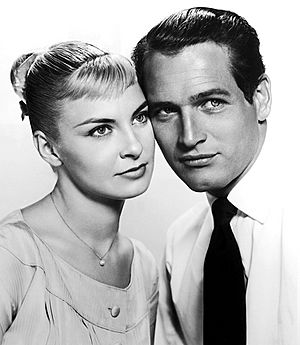
Joanne Woodward met Paul Newman in the early 1950s while working on the play Picnic. They got married on January 29, 1958, after Paul Newman's previous marriage ended. Woodward won her Academy Award soon after, on March 28. Paul Newman was nominated many times but didn't win an Oscar until 1986. Woodward and Newman worked together on many projects. They either acted together or he directed or produced the films.
Woodward and Newman appeared in many movies together in the 1950s and 1960s. Their first film together was The Long Hot Summer (1958). Other movies included Rally 'Round the Flag, Boys! (1958), From the Terrace (1960), Paris Blues (1961), and A New Kind of Love (1963). They also returned to Broadway in the play Baby Want a Kiss (1964).
Paul Newman directed Joanne in several projects. The first was his directing debut, Rachel, Rachel (1968). Both Joanne and Paul received Golden Globe Awards and Oscar nominations for this film. They also acted together in Winning (1969), WUSA (1970), and The Drowning Pool (1975). Woodward also worked with her daughters. She appeared with Nell in The Effect of Gamma Rays on Man-in-the-Moon Marigolds (1972), which Paul Newman directed. She also worked with Melissa in the TV movie See How She Runs (1978).
After their wedding, Woodward won her first Academy Award. Newman received his first Oscar nomination later that year for Cat On a Hot Tin Roof (1958). As successful film stars, Woodward and Newman became a famous couple. Their family life was very important to Woodward, and she sometimes felt it meant she had to slow down her film career. She once said that she "curtailed my career because of my children. Quite a bit."
Woodward's last acting role with Newman was in the 2005 TV miniseries Empire Falls. This was also her last public appearance as an actress.
Later Years and Achievements
In 1990, Woodward acted opposite Newman again in Mr. & Mrs. Bridge (1990). This was one of her most praised performances. She earned her fourth Academy Award nomination for it and was named Best Actress by the New York Film Critics Circle Awards.
In 1993, Woodward appeared in the movie Philadelphia with Tom Hanks. In the same year, she narrated Martin Scorsese's film The Age of Innocence. Woodward also made two more TV films: Foreign Affairs (1993) and Blind Spot (1993). ..... She also co-starred in the TV film Breathing Lessons (1995).
In the 2000s, Woodward took on more roles behind the scenes. She was the artistic director of the Westport Country Playhouse from 2001 to 2005. She was also an executive producer for the 2003 TV production of Our Town, which featured Newman as the stage manager. She and Newman also appeared in Empire Falls (2005) for TV.
In 2022, Woodward and Newman were the focus of a six-part documentary by Ethan Hawke called The Last Movie Stars, which was shown on HBO Max.
Personal Life
Joanne Woodward first met Paul Newman at their agent's office. They were understudies for the play Picnic in 1953. They later starred together in The Long, Hot Summer in 1957. Newman married Woodward on January 29, 1958, in Las Vegas. They remained married for 50 years until Newman's death from lung cancer on September 26, 2008. .....
Woodward has three daughters with Newman: Elinor Teresa "Nell" (born 1959), Melissa Stewart (born 1961), and Claire Olivia "Clea" (born 1965).
She started taking ballet lessons in her thirties to stay fit. Woodward and Newman also helped mentor actress Allison Janney, whom they met when Janney was in college.
Woodward and Newman were strong supporters of the Democratic Party. They were also known for their charity work. In 1988, Newman and Woodward started the Hole in the Wall Gang Camp. This camp provides free services to children and their families who are dealing with cancer and other serious illnesses. The camp is located in Ashford, Connecticut. In 2012, their daughter Clea Newman took over leading the camp's main organization, the SeriousFun Children's Network.
In 1990, after working on her degree for over 10 years, Woodward graduated from Sarah Lawrence College alongside her daughter Clea. Paul Newman gave the graduation speech. In 1992, Woodward and Newman received the Kennedy Center honors for their lifetime achievements.
Joanne Woodward, who became a widow in 2008, lived for many years in Westport, Connecticut, where she and Newman raised their daughters. She has stepped back from public life since being diagnosed with Alzheimer's disease in 2007. She moved to Santa Monica, California, to be closer to her daughters after her diagnosis. Woodward's last public appearance was in 2013.
Acting Credits
Film Roles
| Year | Title | Role | Notes |
|---|---|---|---|
| 1955 | Count Three and Pray | Lissy | |
| 1956 | A Kiss Before Dying | Dorothy "Dorie" Kingship | |
| 1957 | The Three Faces of Eve | Eve White / Eve Black / Jane | |
| No Down Payment | Leola Boone | ||
| 1958 | The Long, Hot Summer | Clara Varner | |
| Rally Round the Flag, Boys! | Grace Oglethorpe Bannerman | ||
| 1959 | The Sound and the Fury | Quentin Compson / Narrator | |
| 1960 | The Fugitive Kind | Carol Cutrere | |
| From the Terrace | Mary St. John | ||
| 1961 | Paris Blues | Lillian Corning | |
| 1963 | The ... | Lila Green | |
| A New Kind of Love | Samantha "Sam" Blake / Mimi | ||
| 1964 | Signpost to Murder | Molly Thomas | |
| 1966 | A Big Hand for the Little Lady | Mary | |
| A Fine Madness | Rhoda Shillitoe | ||
| 1968 | Rachel, Rachel | Rachel Cameron | |
| 1969 | Winning | Elora Capua | |
| 1970 | WUSA | Geraldine | |
| 1971 | They Might Be Giants | Dr. Mildred Watson | |
| 1972 | The Effect of Gamma Rays on Man-in-the-Moon Marigolds | Beatrice Hunsdorfer | |
| 1973 | Summer Wishes, Winter Dreams | Rita Walden | |
| 1975 | The Drowning Pool | Iris Devereaux | |
| 1978 | The End | Jessica Lawson | |
| 1984 | Harry & Son | Lilly | |
| 1987 | The Glass Menagerie | Amanda Wingfield | |
| 1990 | Mr. & Mrs. Bridge | India Bridge | |
| 1993 | The Age of Innocence | Narrator | Voice |
| Philadelphia | Sarah Beckett | ||
| 1996 | Even If a Hundred Ogres... | Narrator | Voice |
| 2010 | Change in the Wind | Margaret Mitchell | Voice |
| 2012 | Gayby | Jenn's Mother | Voice, uncredited |
| 2013 | Lucky Them | Doris | Voice, also executive producer |
Television Roles
| Year | Title | Role | Notes |
|---|---|---|---|
| 1952 | Tales of Tomorrow | Pat | Episode: "The Bitter Storm" |
| 1952–1953 | Omnibus | Ann Rutledge | Episode: "Mr. Lincoln" |
| 1953–1954 | The Philco Television Playhouse | Emily | Episode: "The Dancers" |
| 1954 | The Ford Television Theatre | June Ledbetter | Episode: "Segment" |
| The Elgin Hour | Nancy | Episode: "High Man" | |
| Lux Video Theatre | Jenny Townsend | Episode: "Five Star Final" | |
| 1952–1954 | Robert Montgomery Presents | Elsie / Penny | 2 episodes |
| 1955 | The Star and the Story | Jill Andrews | Episode: "Dark Stranger" |
| The 20th Century Fox Hour | Eleanor Apley | Episode: "The Late George Apley" | |
| The United States Steel Hour | Rocky | Episode: "White Gloves" | |
| 1954–1956 | Four Star Playhouse | Ann Benton / Terry Thomas / Victoria | 3 episodes |
| 1954–1956 | Studio One | Christiana / Daisy / Lisa | 3 episodes |
| 1956 | Alfred Hitchcock Presents | Beth Paine | Season 1 Episode 39: "Momentum"
Season 3 Episode 36: "The Safe Place" |
| GE True | Ann Rutledge | Episode: "Prologue to Glory" | |
| The Alcoa Hour | Margaret Spencer | Episode: "The Girl in Chapter One" | |
| Climax! | Katherine | Episode: "Savage Portrait" | |
| 1958 | Playhouse 90 | Louise Darling | Episode: "The 80 Yard Run" |
| 1971 | All the Way Home | Mary Follet | Television film |
| 1976 | The Carol Burnett Show | Midge Gibson | Episode: "The Family: Friend from the Past" |
| Sybil | Dr. Cornelia B. Wilbur | Miniseries | |
| 1977 | Come Back, Little Sheba | Lola Delaney | Television film |
| 1978 | See How She Runs | Betty Quinn | Television film |
| A Christmas to Remember | Mildred McCloud | Television film | |
| 1979 | The Streets of L.A. | Carol Schramm | Television film |
| 1980 | The Shadow Box | Beverly | Television film |
| 1981 | Crisis at Central High | Elizabeth Huckaby | Television film |
| 1982 | Candida | Candida | Television film |
| 1984 | Passions | Catherine Kennerly | Television film |
| 1985 | Do You Remember Love | Barbara Wyatt-Hollis | Television film |
| 1993 | Foreign Affairs | Vinnie Miner | Television film |
| Blind Spot | Nell Harrington | Television film | |
| The Roots of Woe | Margaret Sanger | Voice, television film | |
| 1994 | Breathing Lessons | Maggie Moran | Television film |
| 2003 | Our Town | N/A | Television film, executive producer |
| 2005 | Empire Falls | Francine Whiting | Miniseries |
Theater Roles
| Year | Title | Role | Playwright | Venue | Ref. |
|---|---|---|---|---|---|
| 1955 | The Lovers | Douane | Leslie Stevens | Martin Beck Theatre, Broadway | |
| 1964 | Baby Want a Kiss | Mavis | James Costigan | Little Theatre, Broadway | |
| 1981 | Candida | Candida | George Bernard Shaw | Circle in the Square, Broadway | |
| 2002 | Our Town | Artistic Director | Thorton Wilder | Booth Theater, Broadway |
Awards and Recognition
In 1958, Woodward won the Academy Award for Best Actress for her role in The Three Faces of Eve. In 1960, she won the Silver Shell for Best Actress at the San Sebastián International Film Festival for her work in The Fugitive Kind. She was also nominated for Best Actress in 1969 for Rachel, Rachel, in 1974 for Summer Wishes, Winter Dreams, and in 1991 for Mr. & Mrs. Bridge. She was named Best Actress at the Cannes Film Festival in 1974 for her performance in The Effect of Gamma Rays on Man-in-the-Moon Marigolds.
Woodward won two Primetime Emmy Awards. One was for See How She Runs, where she played a divorced teacher training for a marathon. The other was for Do You Remember Love, where she played a professor dealing with Alzheimer's disease. She was nominated for 5 other TV roles.
A common story is that Joanne Woodward was the first celebrity to get a star on the Hollywood Walk of Fame. However, all the first 1,550 stars were put in place at the same time in 1960. No single star was officially "first." The first star that was actually finished being built belonged to director Stanley Kramer. The story about Woodward being first might come from the fact that she was the first celebrity to agree to pose with her star for photographers.
In 1994, Joanne Woodward and Paul Newman together received the Award for Outstanding Public Service Benefiting the Disadvantaged. This award is given each year by the Jefferson Awards for Public Service.
See also
 In Spanish: Joanne Woodward para niños
In Spanish: Joanne Woodward para niños
 | Selma Burke |
 | Pauline Powell Burns |
 | Frederick J. Brown |
 | Robert Blackburn |


